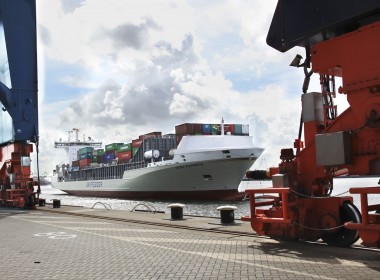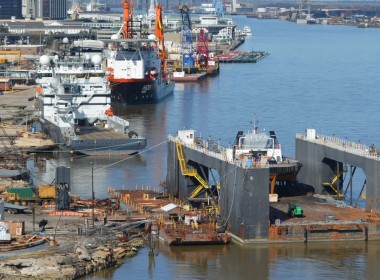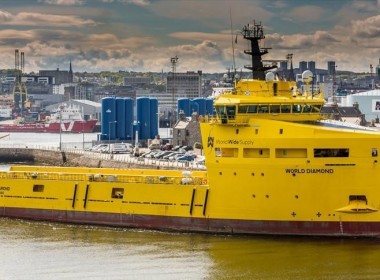REMINISCENCES | Stepping into a modern age of shipboard communication

We take modern communications for granted these days and are exasperated beyond belief if our amazing mobile phone, for some reason, cannot get a signal. But ship to shore voice communication has not been with us much more than sixty years or so, and until the 1970s at least, people relied on signal lamps, Morse code, and even semaphore to get their ideas across a narrow piece of water if it was too wide to shout.
It was a coastal voyage out of our home port of London when I first became acquainted with the wonders of very high frequency (VHF) radio with the equipment having been installed a day or two earlier as we lay in the King George V Dock. None of us had met this newfangled machine before, although it was understood the installation engineer had briefed the second mate on how to operate it. It came with a sort of manual, which appeared to be written in code but turned out to have been for the benefit of the installation engineer and not the unfortunate users.
Sadly, the second mate, to whom the operating secrets had been vouchsafed, had immediately gone on leave, taking the secrets with him, hence leaving none of us able to work this latest illustration of the technologists’ brilliance. This, I regret to say, was par for the course, as new equipment around that time had a habit of appearing fixed to a previously blank bit of bulkhead on the bridge with nobody entirely sure of how it got there.
“The owners, clearly determined to pinch pennies, had bought some second-rate equipment from a rival supplier.”
Anyway, it didn’t appear to be that important, and the ship was sailed and taken through the lock with the familiar and traditional blasts of bells and whistles, telephone communications to bow and stern, amplified by loud shouting. The river passage began and the pilot cheerfully suggested to the master that with this gleaming new equipment we would be able to communicate with traffic control at Gravesend Radio. At this, there was a stunned silence and when he had recovered his equanimity, the captain sent the apprentice to summon the radio officer to the bridge. After all, he clearly reasoned, the VHF was radio equipment and clearly fell under the responsibilities of Sparks. He was the man to make this vital link between ship and shore.
There was a long wait, as the RO was not expecting this demand upon his services, but eventually turned up, not looking best pleased. The master showed him the inert equipment and asked him to communicate with port control, by then almost in sight on the riverside. The RO, clearly choosing his words carefully, then explained that he was an employee of Marconi, and if the shipping company had the foresight to install a unit from the comprehensive range, then available from his estimable employer, he would have been delighted to oblige. However, the owners, clearly determined to pinch pennies, had bought some second-rate equipment from a rival supplier and he was unable to touch this obviously deficient installation.
In the gathering gloom of the evening, as the ship sped down the river, crisp helm orders and smart replies demonstrating that this was a crack cargo liner run by serious professionals, there was something of an unseemly exchange between the two quite elderly gentlemen. The RO remained adamant that the VHF was nothing to do with him, and if he even switched the thing on, his operating license would be at stake. The master, a stickler for regulations, knew he was beaten. Eventually the pilot, smoothly segueing from his conning position, quickly activated the set, with which he was clearly familiar, and after a brief warm-up, gave Gravesend Radio their assurance of our identity and destination. It was just so easy, compared to mucking around with Morse lamps and signal flags.
“For the poor old RO, it signified the writing on the wall.”
We were only going as far as Liverpool, and the master, determined not to be wrong-footed by bolshie ROs, spent much of the passage making himself familiar and training the three watch officers in VHF practice. It took some time to familiarise himself (as it did us) with the fact that it was a one-way signal and you had to stop depressing the handset when you wanted to receive, and squeeze to send. He also tended to shout into the handset as if he was addressing the mate on the forecastle. But after a practice run with Dungeness, a couple of ships in the Channel, Lands End Radio, and somebody in the Irish Sea, we were able to summon up the trusty Liverpool pilot boat off Point Lynas as if we had been handling the VHF for years.
The old Morse signal lamp still remained with us for a few more years, but there was no looking back. Our coastal voyage may not have had the drama of Signore Marconi’s famous trans-Atlantic communication, but at the time, we sort of felt that we were moving into a more modern age. For the poor old RO, it signified the writing on the wall.
Submissions wanted! Do you have an exciting, amusing, or downright dangerous anecdote from your time in the maritime world? Send your submissions to: [email protected].







